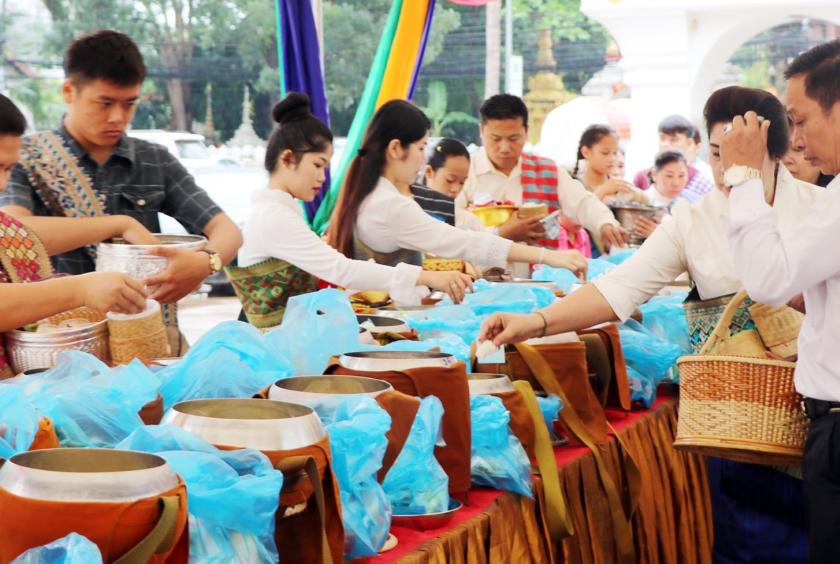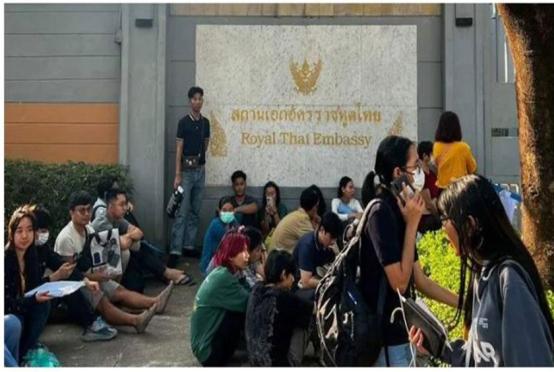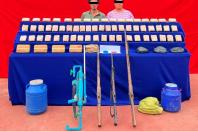VIENTIANE (Vientiane Times/ANN) - Today (Tuesday) is the start of Buddhist Lent and is accompanied by the ceremony known in Laos as Boun Khaophansa when devotees visit temples to gain merit and show their respect for monks.
Every year Lao residents excitedly prepare to usher in the three-month period of Lent, which is viewed as a special and auspicious occasion.
As in previous years, Lao people and foreigners are gearing up for the festival with believers preparing to make donations of food and other offerings, and earn merit at the same time.
Traditional snacks such as khao tom (a sweet made from steamed rice) will be prepared. Yellow robes, candles and incense sticks, along with flowers and basic household items will be offered to monks at temples.
People look forward to this time of the year – locally known as ‘boun’, which translates as merit. The day marks the start of Lent and believers do their bit by doing good.
The day usually begins with almsgiving followed by other offerings at temples through the day.
The most colourful event is the candlelight procession held in the evening when believers head to temples. They follow the monks in a procession, holding candles, flowers and incense sticks. They circle the temple three times, offer prayers, and make wishes.
The candlelight procession is held in honour of Lord Buddha, whose teachings they follow.
Buddhist Lent is an annual three-month retreat that takes place during the rainy season. Monks remain in one temple during this time and the word “phansa” reflects this requirement.
Monks make a vow to this effect after evening prayers on this day and will remain in one particular temple for the duration of Lent.
Khao Phansa falls on the first day after the sighting of the full moon of the eighth lunar month (which this year is July 17).
The Buddhist Lent Festival (Boun Khao Phansa) takes place on the day of the full moon, which this year is July 16.
Over the course of the preceding week, monks around the country clean up their temples and rooms and prepare to welcome the crowds of devotees who will come to give alms.
They also have to prepare themselves physically and mentally to practice austerity during their spiritual confinement for three months.
Monks who do not have a permanent residence have to find a temple to accommodate them before Lent as they cannot travel during these three months.
Men and boys who plan to become novices or enter the monkhood must also organise their stay ahead of Lent as monks and novices cannot change their place of residence during this period.
Several neighbouring countries hold similar festivals and there are short-term orientation sessions for boys who want to stay in temples during their school holidays. If they are able to adapt to the lifestyle, some boys decide to stay on and be ordained, and not return home at the end of Lent.
Believers also try to start afresh on this day, trying to be better people and to give up their bad habits.
For instance, those who are habitual drinkers try to abstain and lead a healthier life. Some actually manage to stay dry for three months, which is a praiseworthy achievement.
Many smokers, too, will try to cut down or give up the habit entirely, and many people do not drink even socially during this period.
Everyone tries to be happy and calm and lead a life which is meaningful. It is a good time to discipline oneself.
Monk Bounma at Nongda village temple in Sikhottabong district, Vientiane, said “During Lent, monks and novices are more disciplined. They wake up for prayers at 4am each day, meditate for longer, and delve deeper into the teachings of the Buddha.”
“It is the most important and meaningful time for monks, novices, nuns, and people who want to learn more about the teachings of the Buddha. The main reason for staying in one place for three months is to learn more about the Buddha’s teachings, purify one’s mind and to meditate,” he explained.
“Ordinary people make merit by making offerings, and some people set goals to help them live a better life. These are some of the things that people typically do during Lent,” he added.
















